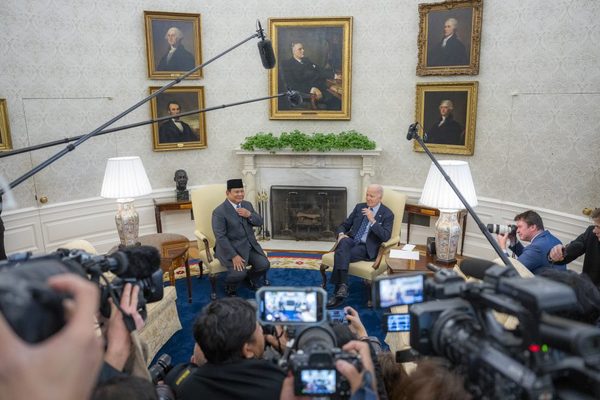
President Joe Biden hosts a bilateral meeting with President Prabowo Subianto of Indonesia, Tuesday, November 12, 2024, in the Oval Office.
As Indonesia approached President Prabowo Subianto’s 100th day in office, Foreign Minister Sugiono held the Ministry of Foreign Affairs’ annual press statement (PPTM) on January 11, outlining the strategic outlook for Indonesian foreign policy over the next five years. The key takeaway, as highlighted by the foreign minister, is that Indonesia is preparing to initiate a “bold and innovative” foreign policy turn. A closer reading suggests that Indonesia may be reconsidering its traditional roles as a regional and middle power, aiming instead to rebrand itself as a global player eager to join the ranks of the world’s major powers.
For decades, the Association of Southeast Asian Nations (ASEAN) has formed the cornerstone of Indonesia’s foreign policy. Widely regarded as ASEAN’s de facto leader, Indonesia has frequently steered the bloc through turbulent waters, from its prominent role in creating the ASEAN Outlook on the Indo-Pacific to leading the development of the Five-Point Consensus on the Myanmar crisis and accelerating negotiations on the Code of Conduct in the South China Sea.
Despite Sugiono’s reaffirmation of ASEAN unity and centrality in the PPTM as well as recent actions by the Prabowo administration paint a different picture. The manifesto of Prabowo’s party, Gerindra, often described as a personal vehicle for his political ambitions, critiques ASEAN solidarity as ineffective when tested against national interests. Tellingly, ASEAN was conspicuously absent from Prabowo’s presidential campaign speeches and debates.
Traditionally, newly inaugurated Indonesian presidents make their first bilateral visits to fellow ASEAN member states, underscoring Indonesia’s regional priorities. Prabowo, however, has not adhered to this tradition. Prabowo’s first state visit after his inauguration was to China on November 8-10, followed by a U.S. visit where he met with President Biden. His only ASEAN-related engagement since assuming office was an informal meeting with Malaysian Prime Minister Anwar Ibrahim on January 9 – an event originally scheduled for December 23. The fact that his staff have offered conflicting reasons for the postponement raises questions about the priority placed on this meeting. Adding to the uncertainty, Sugiono was notably absent from Thailand’s extended ASEAN informal consultations on Myanmar last month, despite the participation of foreign ministers from four other founding ASEAN states.
This pattern of neglect raises questions about Indonesia’s regional leadership. ASEAN has long served as a collective security buffer, a crucial component of Indonesia’s “concentric circles” foreign policy strategy. Yet, the new administration seems less inclined to carry forward this historical asset, signaling a potential shift that could redefine Indonesia’s regional role.
As a middle power among developing nations, Indonesia’s important position in the Non-Aligned Movement (NAM) exemplifies its commitment to an independent and active foreign policy. In his PPTM address, Sugiono referenced the 1955 Bandung Conference, which helped crystallize the NAM as a hallmark of Indonesia’s diplomacy. However, one might wonder if the current administration fully grasps the multifaceted nature of the non-aligned movement. President Prabowo frequently invoked the term “non-aligned,” seemingly framing his foreign policy under the mantra, “a thousand friends is too few, one enemy is too many,” and refraining from choosing sides between the United States and China. While this approach reflects one traditional aspect of the Bandung Spirit, it may not encompass the broader vision of multilateral cooperation and collective strategic agency that the movement advocates.
In a geopolitical climate marked by intensified competition among major powers, Indonesia faces an opportunity to breathe new life into the NAM. This revitalization could involve leveraging multilateral platforms to foster common development and embrace cultural diversity. The forthcoming 70th anniversary of the Bandung Conference presents a timely occasion for Indonesia to reaffirm its commitment to these principles. Additionally, it is noteworthy that Gerindra’s party manifesto characterizes NAM as an “outdated relic of history.” As Prabowo settles into office, his perspective on NAM may evolve. Whether his administration will invigorate the NAM remains to be seen, particularly with regard to the strengthening of Indonesia’s ties with Africa and Latin America.
Since Prabowo’s election victory in February of last year, his diplomatic actions have clearly indicated a foreign policy that prioritizes power and national interest, with a discernible tilt toward major-power diplomacy. His bold peace proposal for the Russia-Ukraine conflict at the 2023 Shangri-La Dialogue, the early visits that he made to China and the United States after his inauguration, and Indonesia’s recent accession to BRICS all reflect this ambition. His administration seems committed to elevating Indonesia’s status to a level on par with the global heavyweights. While commendable for maintaining a non-aligned trajectory, this approach raises questions about how Indonesia will navigate an increasingly polarized world, especially if faced with the return of a Trump presidency and intensifying U.S.-China rivalry.
Some have likened Prabowo’s bold diplomacy to that of former President Susilo Bambang Yudhoyono (SBY). But there is a notable distinction: SBY balanced Indonesia’s global aspirations with a steadfast commitment to ASEAN and its identity as a middle power. Prabowo, by contrast, seems more focused on redefining Indonesia’s global image, even at the potential cost of regional ties and traditional multilateral ties.
As Prabowo embarks on this “innovative” diplomatic path, one is reminded of the old wedding rhyme: “something old, something new.” While innovation may promise a brighter future, Indonesia would do well to remember that its traditional strengths – regional leadership and a commitment to multilateralism among and between developing countries – could serve as invaluable anchors as it seeks a more expansive role on the global stage.






